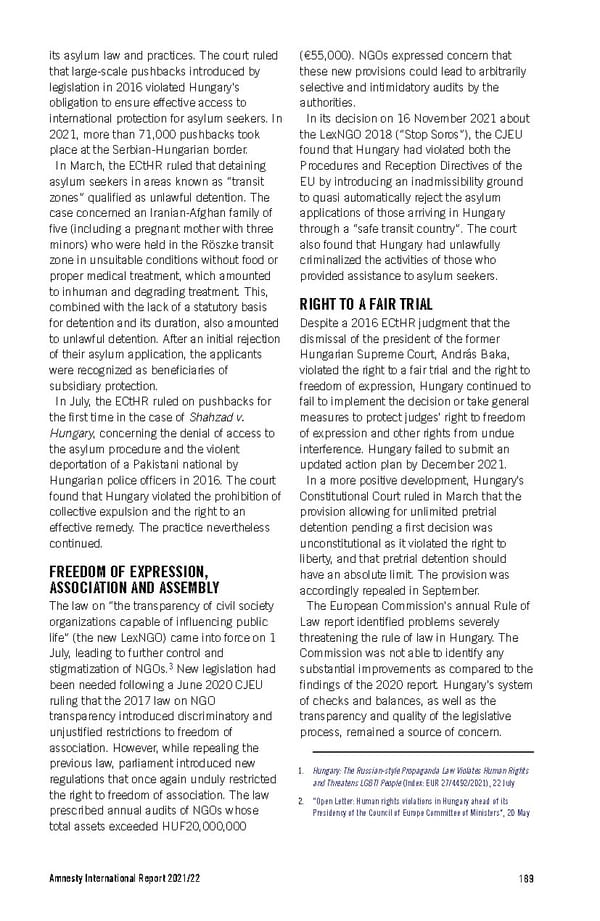its asylum law and practices. The court ruled (€55,000). NGOs expressed concern that that large-scale pushbacks introduced by these new provisions could lead to arbitrarily legislation in 2016 violated Hungary’s selective and intimidatory audits by the obligation to ensure effective access to authorities. international protection for asylum seekers. In In its decision on 16 November 2021 about 2021, more than 71,000 pushbacks took the LexNGO 2018 (“Stop Soros”), the CJEU place at the Serbian-Hungarian border. found that Hungary had violated both the In March, the ECtHR ruled that detaining Procedures and Reception Directives of the asylum seekers in areas known as “transit EU by introducing an inadmissibility ground zones” qualified as unlawful detention. The to quasi automatically reject the asylum case concerned an Iranian-Afghan family of applications of those arriving in Hungary five (including a pregnant mother with three through a “safe transit country”. The court minors) who were held in the Röszke transit also found that Hungary had unlawfully zone in unsuitable conditions without food or criminalized the activities of those who proper medical treatment, which amounted provided assistance to asylum seekers. to inhuman and degrading treatment. This, RIGHT TO A FAIR TRIAL combined with the lack of a statutory basis for detention and its duration, also amounted Despite a 2016 ECtHR judgment that the to unlawful detention. After an initial rejection dismissal of the president of the former of their asylum application, the applicants Hungarian Supreme Court, András Baka, were recognized as beneficiaries of violated the right to a fair trial and the right to subsidiary protection. freedom of expression, Hungary continued to In July, the ECtHR ruled on pushbacks for fail to implement the decision or take general the first time in the case of Shahzad v. measures to protect judges’ right to freedom Hungary, concerning the denial of access to of expression and other rights from undue the asylum procedure and the violent interference. Hungary failed to submit an deportation of a Pakistani national by updated action plan by December 2021. Hungarian police officers in 2016. The court In a more positive development, Hungary’s found that Hungary violated the prohibition of Constitutional Court ruled in March that the collective expulsion and the right to an provision allowing for unlimited pretrial effective remedy. The practice nevertheless detention pending a first decision was continued. unconstitutional as it violated the right to FREEDOM OF EXPRESSION, liberty, and that pretrial detention should ASSOCIATION AND ASSEMBLY have an absolute limit. The provision was accordingly repealed in September. The law on “the transparency of civil society The European Commission’s annual Rule of organizations capable of influencing public Law report identified problems severely life” (the new LexNGO) came into force on 1 threatening the rule of law in Hungary. The July, leading to further control and Commission was not able to identify any 3 stigmatization of NGOs. New legislation had substantial improvements as compared to the been needed following a June 2020 CJEU findings of the 2020 report. Hungary’s system ruling that the 2017 law on NGO of checks and balances, as well as the transparency introduced discriminatory and transparency and quality of the legislative unjustified restrictions to freedom of process, remained a source of concern. association. However, while repealing the previous law, parliament introduced new 1. Hungary: The Russian-style Propaganda Law Violates Human Rights regulations that once again unduly restricted and Threatens LGBTI People (Index: EUR 27/4492/2021), 22 July the right to freedom of association. The law 2. “Open Letter: Human rights violations in Hungary ahead of its prescribed annual audits of NGOs whose Presidency of the Council of Europe Committee of Ministers”, 20 May total assets exceeded HUF20,000,000 Amnesty International Report 2021/22 189
 Amnesty International Report 2021/22 Page 188 Page 190
Amnesty International Report 2021/22 Page 188 Page 190